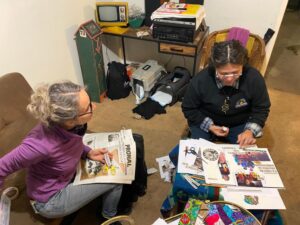¿Qué es SIGNAL LANDSCAPE?
SIGNAL LANDSCAPE es un proyecto de investigación financiado por la Comisión Europea dentro de la convocatoria de becas postdoctorales Marie Sklodowska-Curie (H2020 MSCA). Su título completo en inglés es “New approaches to mapping the signs of violence and care in the migratory landscapes of silenced women”. Es un proyecto que realiza la investigadora Esperanza Jorge Barbuzano en la Universidad de Cádiz (España) y la Universidad de Wisconsin-Madison (Estados Unidos).
Actualmente, la migración está planteando un desafío global para la formación de sociedades y Estados, siendo un factor clave la feminización del fenómeno. Cuando el proceso migratorio se realiza en situaciones de vulnerabilidad, puede vincularse a estructuras generadoras de violencia, explotación, desaparición y/o trata de personas. Las rutas que van desde Centroamérica a los EE.UU. por vía terrestre presentan ejemplos de estas estructuras. El proyecto SIGNAL-LANDSCAPE pretende:
1) Construir una cartografía creativa y transnacional que refleje los puntos de daño, así como el cuidado y resistencia de la ruta migratoria.
2) Diseñar métodos y herramientas que faciliten los procesos de construcción de la historia de vida evitando la revictimización.
3) Romper el silenciamiento al que son sometidas las historias de las mujeres migrantes, generando así resultados narrativos.
4) Producir conocimiento académico, que llegará a determinados espacios para el diseño de políticas y redes sociales.
Para dar respuesta a estos objetivos, se propone una etnografía multisituada: origen (Honduras), ruta (México-Guatemala) y destino (EEUU). En estos espacios, se trabajará con mujeres, a través de organizaciones locales, para construir narrativas creativas que permitan diseñar: 1) los paisajes físicos que reflejan el daño y el cuidado que las mujeres han experimentado a lo largo de la ruta; y 2) los paisajes geográficos y sociales de sus experiencias.
Taller de narrativas creativas sobre el paisaje de México para las mujeres migrantes. Tijuana. Diciembre 2022

